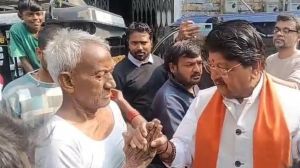Another retreat
It is just as well that the government has seen the wisdom of climbing down on extending the membership of the Chief Vigilance Commission...

It is just as well that the government has seen the wisdom of climbing down on extending the membership of the Chief Vigilance Commission to non-bureaucrats without provoking an unnecessary confrontation with the Supreme Court.
Considering the court8217;s directions about a statutory Chief Vigilance Commission, there is little reason to think it would have ruled to overturn its own directives on the petition challenging the CVC ordinance. Certainly it would have been better for the government to have complied with the court8217;s directions in the first instance, especially if it had no appetite for such a confrontation.
A climbdown now means not only a loss of face, it is a sign both of weak conviction and a willingness to bend to expediency rather than sticking to principle. Even so, it is better for the government to have changed course now rather than persist and be forced by the court to do so later.
The fact of the matter is that the government has been tricked by the bureaucracy. In that sense, while itmay only have acted to satisfy the court, a good result of the changes made to the ordinance is to symbolically rein in a civil service which appears frankly to have got out of hand.
The CVC ordinance started out being flawed because babudom made sure that it got to keep control over a body which would preside over the fate of civil servants under investigation. Indeed, even though the change now made allows for two non-civil servants as vigilance commissioners, it is hard to see why even the remaining one commissioner must be a civil servant 8212; except as yet another bureaucratic manouver.
The Chief Vigilance Commissioner is already a bureaucrat. That aside, while it was important to ensure that the bureaucracy did not get to be cop in investigations against itself, there is no persuasive reason at all why it has to be represented on the commission. Far better would have been to define other criteria for qualification than whether or not a member was a civil servant.
A consolation is the officialindication that there is no move to make the CVC a single-member body by giving a vote only to the Chief Vigilance Commissioner. If that were to happen, the appointment of non-bureaucrats as assistants to the CVC would be plain eyewash, and the babus would get through the back door what was denied them through the front door.
On the demise of the so-called single-point directive there is perhaps less cause for enthusiasm. There is truth in the Supreme Court8217;s belief that investigations would be hamstrung if government permission had to be obtained for investigating senior officials.
But this newspaper continues to believe that investigating agencies cannot become a law unto themselves either. If a sword were to dangle over officials8217; heads the whole time they would be even more reluctant to take decisions than they are now, their risk aversion growing in proportion to their vulnerability. Still, now that it has gone, it is to be hoped that the court will make sure that the pendulum does not swing from oneextreme to the other, from unaccountable officialdom to unanswerable investigators presiding over an inquisition.
- 01
- 02
- 03
- 04
- 05































